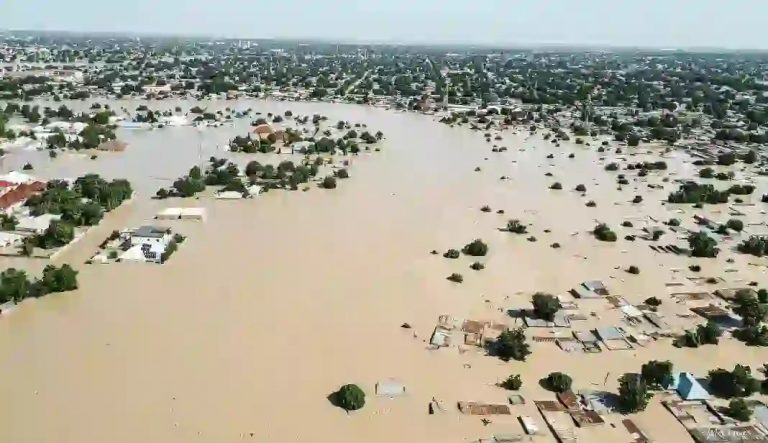
The National Emergency Management Agency (NEMA) has raised alarms over the devastating impact of flooding across Nigeria, revealing that 29 states and 172 local government areas (LGAs) have been affected, with over a million people impacted.
The alarms follow the devastating impact of flood in Borno State, following the collapse of the Alau Dam.
In an update at the National Emergency Coordination Forum (ECF) meeting, NEMA Director General Zubaida Umar shared the grim statistics, highlighting the agency’s ongoing efforts to manage the crisis. According to her, the flooding pattern aligns with predictions made by the Nigeria Hydrological Services Agency (NIHSA) in their Annual Flood Outlook, which had warned that between July and September 2024, 33 states and 135 LGAs would face high flood risks.
Register for Tekedia Mini-MBA edition 19 (Feb 9 – May 2, 2026): big discounts for early bird.
Tekedia AI in Business Masterclass opens registrations.
Join Tekedia Capital Syndicate and co-invest in great global startups.
Register for Tekedia AI Lab: From Technical Design to Deployment (next edition begins Jan 24 2026).
The agency said the flooding has displaced 625,239 people, claimed 259 lives, and left communities grappling with widespread destruction.
Despite the pre-warning, Borno State, which now grapples with its worst flooding in three decades, is said to be ill-prepared to mitigate the crisis. Floodwaters have ravaged the area after the Alau Dam overflowed due to heavy rains, leading to the displacement of hundreds of thousands and at least 30 fatalities.
Natural or Man-made Disasters?
This disaster has raised serious concerns about the state’s use of funds designated for flood control, as well as broader concerns over how ecological funds are utilized in Nigeria.
Borno State’s failure to adequately prepare for this year’s flooding crisis has drawn scrutiny, particularly as data reveals that the state received N816.34 million from the Ecological Fund between January and June 2024. The Ecological Fund, established to address environmental challenges such as flooding, erosion, and desertification, is meant to be a vital resource in states prone to natural disasters.
However, despite the increase in total Ecological Fund allocations to Borno, the state has only spent a fraction of it on flood and erosion control. A breakdown of the funds received shows a steady increase compared to 2023, with allocations for the first half of 2024 reaching N816.34 million—an 8.89% rise over the N749.68 million disbursed in the same period last year. Yet, despite these significant allocations, just N20 million, or 2.45%, of the total Ecological Fund has been spent on flood control projects in the first half of 2024.
This underutilization is a recurring issue. In 2023, despite allocating N1.042 billion for flood and erosion control, Borno spent none of it, leaving the state vulnerable to the disasters that have now wreaked havoc. The 2024 revised budget earmarked N1.653 billion for these purposes, but only 1.2% has been utilized, reflecting a concerning trend in the state’s failure to prevent floods.
Consequences of Inaction
The lack of investment in flood mitigation efforts is now taking its toll on Borno State, which has seen massive displacement and significant loss of life. Residents describe harrowing scenes as homes and livelihoods were washed away, with many seeking refuge in makeshift camps for internally displaced persons (IDPs).
Borno Governor Babagana Zulum, alongside the state’s emergency management teams, has spearheaded the response efforts, setting up IDP camps and providing relief to affected persons.
Umar commended the Borno State government for its prompt response in the aftermath of the floods but stressed that the lack of proactive measures had compounded the situation. She outlined NEMA’s intervention strategy, which includes deploying additional personnel for search and rescue operations, distributing water purification kits and critical rescue equipment, and providing food and non-food items to support displaced populations.
“Our agency, NEMA, is working tirelessly to assist those impacted by this disaster, and we assure the victims that sustainable support will be provided. We appreciate the collaboration of our humanitarian partners and stakeholders in addressing the crisis,” said Umar during the ECF meeting.
She added that NEMA’s efforts are nationwide, with multiple states receiving ongoing support.
While Borno State has been severely affected, the flooding crisis is nationwide, with NEMA confirming that 29 states have reported significant impacts from heavy rainfall and river overflow. The flooding has not only displaced people but also destroyed infrastructure, agricultural lands, and livelihoods.
In reviewing the situation, experts and environmental advocates point to the lackluster approach by government authorities in tackling the root causes of the recurring floods. Poor drainage systems, failure to enforce urban planning regulations, and delays in executing flood control projects are all contributing factors. Additionally, the underutilization of ecological funds in flood-prone states is described as a persistent challenge in Nigeria’s disaster management framework.
In light of the devastating impact of the current floods, there is a growing consensus that both state and federal governments need to adopt a more proactive and transparent approach to managing ecological funds. NEMA’s ongoing interventions are helping to provide relief, but experts have called for long-term solutions to be implemented to safeguard communities from the recurring dangers of flooding.



